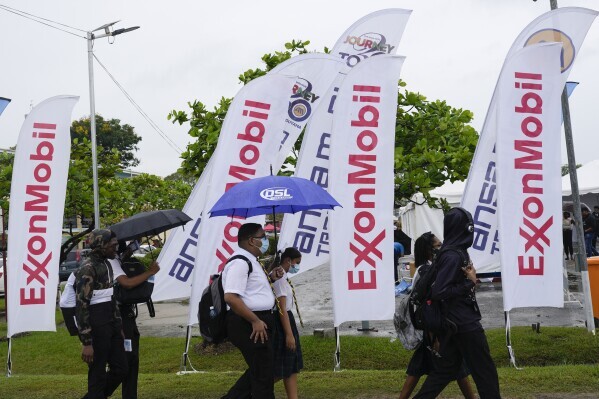The Venezuelan government has accused its neighboring country, Guyana, of granting illegal oil exploration concessions within disputed territory, asserting its right to take necessary diplomatic actions in response.
This statement follows Guyana’s report of satellite imagery showing Venezuelan military movements near the eastern border shared between the two South American nations.
Venezuela did not refute Guyana’s claims of military and infrastructure buildup but justified it as a reinforcement of border security.
According to Venezuela, Guyana granted illegal oil concessions within an area that Venezuela considers unquestionably its own.
Despite the territorial dispute, oil giant ExxonMobil plans to continue increasing production in offshore fields off Guyana.

The border disagreement has persisted for decades, with Venezuela laying claim to the mineral-rich Essequibo region, encompassing a significant portion of Guyana’s land.
Both countries have accused each other of violating the peace agreement signed in December, mediated by Brazil and Caribbean governments, aiming to ease tensions over border demarcation.
The recent developments occurred shortly after satellite images revealed Venezuela’s expansion of its base on Ankoko Island, which Venezuela partially seized from Guyana in the 1960s, as well as nearby Punta Barima.
These infrastructural developments were noted by the US Center for Strategic and International Studies (CSIS), prompting Guyana to reaffirm its commitment to the Argyle Declaration and call for mutual respect from Venezuela.
Guyana asserts that an international boundary commission settled the border demarcation in 1899, but Venezuela has disputed this for over 60 years, claiming unfair treatment regarding the Essequibo region.
While Guyana has brought the matter to the World Court for a definitive ruling, Venezuela prefers bilateral talks.
The Venezuelan Defense Ministry accused Guyana of endangering the St. Vincent agreement through irresponsible actions and media manipulation, maintaining its claim over the Essequibo.
It also alleged collaboration between ExxonMobil, the Guyanese government, and the US military in exploiting oil and gas resources in disputed waters.
A meeting between Guyanese President Irfaan Ali and Venezuelan President Nicolás Maduro is anticipated in March for further discussions on the border issue.
In a show of support, several high-ranking American administration and military officials have visited Guyana recently, with the US providing military overflights to monitor Venezuelan activities during heightened tensions in December.

